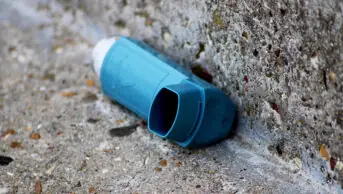
Wes Mountain/The Pharmaceutical Journal
Approximately 73 million inhalers are prescribed in the UK annually, which currently constitutes around 3% of total NHS UK emissions. The majority of inhalers — many of which contain chemical propellants that are known greenhouse gases, plastic and aluminium — are disposed of through the municipal waste collection process. Disposal through municipal waste streams can lead to the devices being transferred to landfill sites, the propellant leaking into the atmosphere and the other materials being unrecoverable.
There have been previous initiatives focusing on inhaler recovery and recycling. The GlaxoSmithKline-led model allowed patients across the UK to drop off their inhalers at community pharmacies and operated from 2012 until 2020. More recently, Chiesi demonstrated that inhalers could be recovered and recycled using postal return. ‘Take AIR’, a Chiesi scheme supported by University Hospitals of Leicester NHS Trust and Leicestershire and Rutland Local Pharmaceutical Committee, was launched in Leicestershire and ran from 2021 to 2023, collecting 52,000 inhalers.
These schemes demonstrated the feasibility of inhaler recovery and laid the groundwork for further initiatives to continue and expand the efforts beyond the projects’ duration.
It is estimated that 20,400 inhalers have been returned for recycling so far
Building on lessons learned from previous schemes, a pilot launched by NHS Kent and Medway Integrated Care Board in November 2023 in collaboration with Chiesi, named ‘Re-Hale’, is currently demonstrating that inhaler recycling can be successfully delivered in the East Kent footprint. East Kent was selected as the location with multiple healthcare settings identified, an existing logistical framework and no current ability to recycle inhalers. Re-Hale is a 12-month pilot that encourages patients to drop off inhalers, of any brand and any type, to a variety of healthcare settings across East Kent, including community pharmacies, dispensing GP practices and acute hospital pharmacies. Information is available through a website that allows the public to see their closest Re-Hale collection point.
The scheme operates using existing infrastructure in the system by using Alliance Healthcare’s regular transport services when delivering supplies to these sites. To ensure no additional van journeys are required, used and unwanted inhalers are collected from the drop-off site during the wholesaler’s routine medicines deliveries. The distribution of collection bins and the collection process is managed via Alliance’s online portal.
The wholesaler takes the bins to a central depot, where the waste inhalers are consolidated into a larger bin. Once full, the waste is collected by a dedicated waste management company and taken to their facility for recycling treatment.
The recycling process captures the remaining propellant gas, which is repurposed and used for refrigeration and air conditioning systems, while the aluminium canisters are crushed, smelted and re-used and recyclable plastic is pelletised. Although the components of some inhalers, such as dry powder inhalers, are complex and therefore not currently recyclable, they are incinerated at high temperatures and converted into energy through the energy from waste process.
In East Kent, 78 sites — 59 of which are community pharmacies — are currently participating in the scheme and it is estimated that 20,400 inhalers have been returned for recycling so far. Although Re-Hale is a pilot, it has the potential to be replicated on a larger scale. To enable this, the project team are currently working on developing a toolkit to share insights and provide guidance on how this work can be expanded and implemented nationally.
This work is part of a collaborative working project between NHS Kent and Medway and Chiesi. For further information, please see the project executive summary which can be found on all partners’ websites.
- This article was amended on 30 July 2024 to correct the name of NHS Kent and Medway Integrated Care Board


